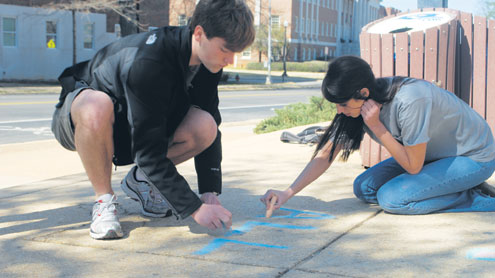Recent changes to the Student Government Association’s election policy and procedures have prohibited candidates from the use of chalk in their election campaigns.
According to Kelli Knox-Hall, senior assistant director of the Ferguson Center and chair of the SGA Elections Committee, this semester will be the third election in which candidates are not permitted to chalk or distribute stickers.
Without chalk, candidates have been forced to take advantage of other methods. Sydney Page, current senator for the College of Arts & Sciences, has used this as an opportunity to take a different approach in terms of campaigning for re-election.
“I have taken advantage of other campaigning methods, such as walking up and talking with students about my campaign, passing out flyers and buttons as well as utilizing social media sites such as my personal website, Facebook and Twitter,” she said. “Since chalking is not allowed, this rule has forced me and other candidates to think outside of the box in terms of how to reach out to as many people as possible.”
Many candidates have also adopted methods such as social media and websites to enhance their campaign. In order to increase awareness, several organizations and departments across campus have invited SGA candidates to speak and share their platforms to the members of their organizations.
Originally, candidates were allowed to chalk as long as it adhered to strict guidelines. For example, according to the Student Handbook, chalking was only permitted on natural, gray sidewalks. No chalking was allowed on covered sidewalks or building entrances, and it could not be closer than 20 feet to a building or structure.
In addition, organizations and departments were prohibited from chalking on the Ferguson Plaza, Crimson Promenade, around the Law School and certain areas of the Recreation Center.
In past elections, despite the guidelines, the sidewalks on campus were usually adorned in candidates’ slogans, the voting date for the SGA election and voting procedures. Several students reported a noticeable difference in the election.
“It’s harder to spread the word that you are running. Exposure is much lower,” graduate student Ryan Missanelli said.
Because students interested in voting can no longer walk to class along chalked sidewalks, they are required to take a more active role in selecting a candidate for office by paying closer attention to social media sites, visiting the websites of candidates or attending debates and other events.
In recent years, the percentage of students voting in SGA elections has been relatively low in comparison to UA’s total enrollment. SGA’s amendment to the campaigning process can likely serve as an advantage in increasing its numbers.
“With more candidates having to result to more personable methods of campaigning, such as walking up to people and handing them campaign materials, students will take the time to learn more about the candidates and participate in this year’s elections,” Page said.
For more information regarding the SGA election and its candidates, visit www.vote.ua.edu. Voting will take place online at mybama.ua.edu on Tuesday, March 6. Polls will be open from 7 a.m. until 7 p.m.









